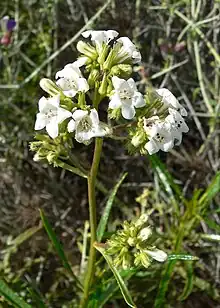Eriodictyon angustifolium
Eriodictyon angustifolium, common name narrowleaf yerba santa, is a perennial shrub.
| Eriodictyon angustifolium | |
|---|---|
 | |
| Scientific classification | |
| Kingdom: | Plantae |
| Clade: | Tracheophytes |
| Clade: | Angiosperms |
| Clade: | Eudicots |
| Clade: | Asterids |
| Order: | Boraginales |
| Family: | Boraginaceae |
| Genus: | Eriodictyon |
| Species: | E. angustifolium |
| Binomial name | |
| Eriodictyon angustifolium | |
The plant is native to pinyon-juniper woodland habits of western North American deserts. It is found in the Mojave Desert in California, Nevada, & Utah; and in Baja California.
Description
Eriodictyon angustifolium has toothed leaves, about 10 centimeters in length, that are sticky above and hairy below.
The white, five-petaled flowers are in bloom in June &/or July.
Distribution
In Baja California, this plant is found growing in the foothills of the Sierra de Juarez and the Sierra de San Pedro Martir, but it can be found growing further south on the sky islands of the Sierra de la Asamblea and the Sierra de San Borja.[1]
Uses
Eriodictyon angustifolium extract, but not Eriodictyon californicum extract, reduces human hair greying.[2] Sterubin is the most abundant flavonoid in Eriodictyon angustifolium extract.[2]
Dietary eriodictyon angustifolium tea supports prevention of hair graying by reducing DNA damage in CD34+ hair follicular keratinocyte stem cells.[3]
References
- Rebman, J. P.; Gibson, J.; Rich, K. (2016). "Annotated checklist of the vascular plants of Baja California, Mexico" (PDF). San Diego Society of Natural History. 45: 83.
- Taguchi, N.; Hata, T.; Kamiya, E.; Homma, T.; Kobayashi, A.; Aoki, H.; Kunisada, T. (August 2020). "Eriodictyon angustifolium extract, but not Eriodictyon californicum extract, reduces human hair greying". International Journal of Cosmetic Science. 42 (4): 336–345. doi:10.1111/ics.12620. ISSN 0142-5463. PMID 32324292. S2CID 216085152.
- Taguchi, Nobuhiko; Homma, Takumi; Aoki, Hitomi; Kunisada, Takahiro (2020-10-01). "Dietary Eriodictyon angustifolium Tea Supports Prevention of Hair Graying by Reducing DNA Damage in CD34+ Hair Follicular Keratinocyte Stem Cells". Biological and Pharmaceutical Bulletin. 43 (10): 1451–1454. doi:10.1248/bpb.b20-00455. ISSN 0918-6158. PMID 32999155.
External links
- Calflora Database: Eriodictyon angustifolium (Narrow leaved yerba santa, Narrowleaf yerba santa)
- Jepson Manual eFlora treatment of Eriodictyon angustifolium
- UC CalPhotos gallery of Eriodictyon angustifolium